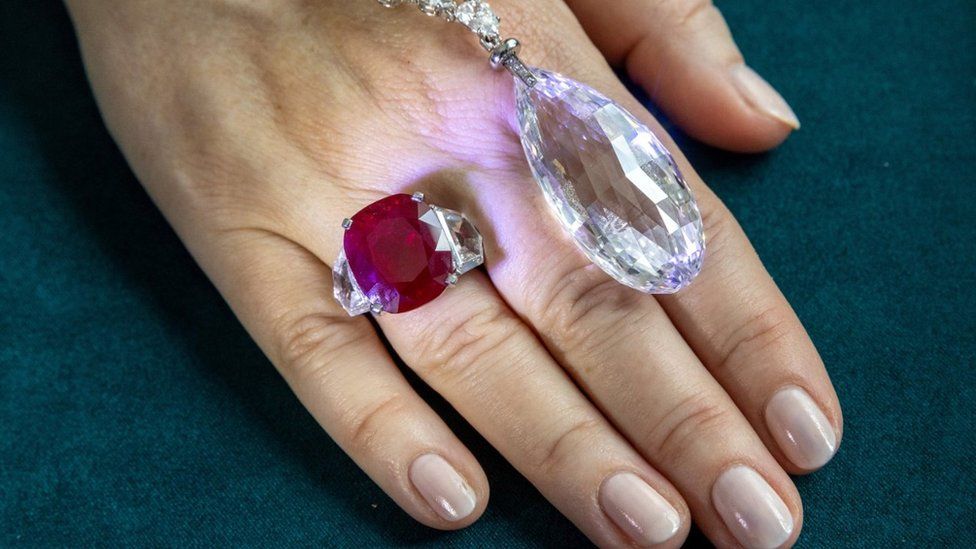-
Published
Related Topics

Jewish groups have condemned the multi-million dollar sale of jewels belonging to a billionaire whose husband made his fortune in Nazi Germany.
Heidi Horten was an Austrian heiress whose German husband, Helmut Horten, had been a Nazi party member.
He took over Jewish firms as their owners left 1930s Germany.
Christie’s auction house is now putting 700 pieces of jewellery, estimated to be worth more than $150 million (£118 million), under the hammer.
The proceeds will go to charity, including Holocaust research, and Christie’s will also make a “significant contribution” to good causes.
Mrs Horten died last year aged 81, with a fortune of $2.9 billion, according to Forbes.
Her husband, who died in Switzerland in 1987, took over textile company Alsberg after its Jewish owners fled in 1936.
This was the first of several Jewish businesses he acquired under Nazi rule. His department store Horten AG became one of the biggest in Germany.
A recent report by historians commissioned by the Horten Foundation found had been a member of the Nazi party before being expelled.
The pieces going on sale include the 90-carat “Briolette of India” diamond necklace by Harry Winston, and the Sunrise Ruby, a diamond ring by Cartier that is worth up to an estimated $20 million.
Almost 100 pieces will be sold in Geneva on Wednesday and another 150 on Friday, with more sold online later in the year.
But the auction has caused anger among Jewish groups, with calls for the sale to be halted.
The Simon Wiesenthal Center, a US-based Jewish human rights group, demanded that Christie’s not go ahead with the sale.
“The Hortens’ billions used to build this collection were also the sum of profits from Nazi ‘aryanization’ of Jewish department stores,” it wrote in a latter to the auction house.
Aryanisation was a term used by the Nazis for taking property from Jews and turning it over to non-Jews, and the exclusion of Jews from business.
Despite proceeds being contributed to charities and Holocaust education, the American Jewish Committee said it was “not enough”.
“Instead, the auction should be put on hold until a serious effort is made to determine what portion of this wealth came from Nazi victims,” it said.
Christie’s should then direct the Horten riches “to the needy and infirm Holocaust survivors who are still among us and the educational programs that tell their stories,” the group added.
Meanwhile, Yonathan Arfi from the Council of Jewish Institutions in France said: “Not only did the funds that allowed the purchase of this jewellery come in part from the Ayranisation of Jewish property… this sale is also to finance a foundation [the Horten Foundation] with the mission to safeguard the name of a former Nazi for posterity.”
But Christie’s have defended the sale.
“The foundation and Christie’s know that all of the proceeds are going towards charities, the charities are child protection and welfare, medical research and access to the arts,” its international head of jewellery Rahul Kadakia told the AFP news agency.
“We believe that in the end, proceeds of the sale is going to do good and this is the reason we decided to take on the project,” he added.
